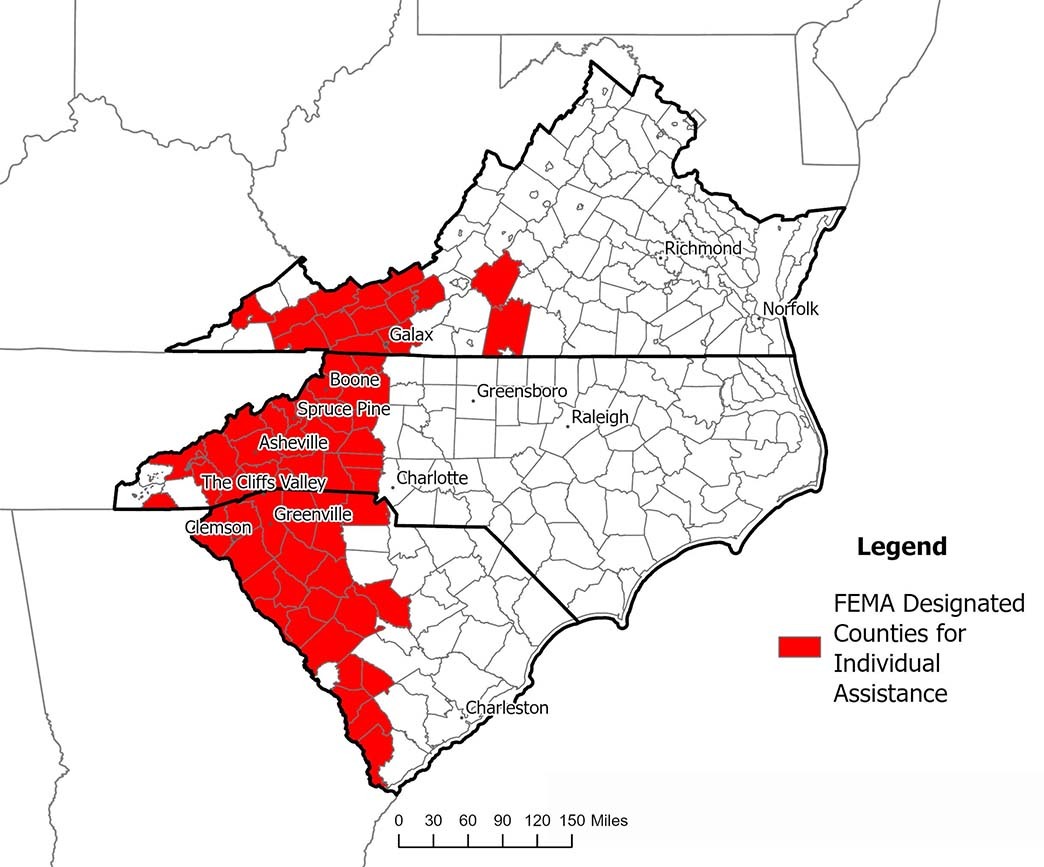The Impact of Hurricane Helene on Fifth District Businesses
Hurricane Helene caused significant disruptions across the Fifth District, especially in western North Carolina, upstate and western South Carolina, and Southwest Virginia. More than 200 people died from the storm, utilities and drinking water became unavailable, and people were displaced from their homes. In the storm's aftermath, the Richmond Fed has been actively monitoring and reporting about its impacts, including on the devastation of Hurricane Helene and what we have been learning as business conditions evolve. In our November business surveys, fielded between Oct. 24 and Nov. 20 (about one month after the hurricane made landfall), we asked about Helene's impact on firms.
The survey results found that Hurricane Helene impacted more than one-third of Fifth District respondent businesses. Unsurprisingly, this figure was higher in FEMA-designated counties. The map below shows which parts of the Fifth District were FEMA-designated counties impacted by Hurricane Helene.
However, areas not directly affected still experienced challenges. Impacts varied across the region, but the two most frequently reported challenges in FEMA-designated counties were reduced operating hours and supply chain disruptions. Damage to property was also a significant factor and sometimes exacerbated the two other major challenges that hurricane-affected businesses faced.
Helene's Impacts Reverberate Throughout the Region, Even in Areas Not Directly Hit
The majority of firms in our November surveys reported that they were not affected by Hurricane Helene (only 35 percent reported being impacted). However, where FEMA designated an area as affected, the percentage of businesses that were impacted jumped to over 60 percent. The most common impact in FEMA-designated areas were supply chain disruptions (28 percent), reduction in operating hours (28 percent), and damage to property or physical assets (22 percent). For example, a North Carolina food manufacturer reported loss of livestock and was not operational for over a week as the city's wastewater systems were not operable. A South Carolina mortgage company put all closings on hold due to properties needing reinspections and repairs.
Among areas not in FEMA-designated areas, 26 percent reported some impact to their business, specifically, supply chain disruptions (12 percent). For example, a Northern Virginia homebuilder experienced construction delays due to utility crews helping in hurricane impacted areas.
Impacted Businesses Eye Quick Recovery
Most businesses that were impacted by Hurricane Helene are already fully operational. Even in FEMA-designated areas, 79 percent reported they were back to full operations, and 18 percent expect to return to full operations in one to three months. For example, a quick-service restaurant was without power for a few days. During that time, the company lost inventory due to no refrigeration, so they had to modify their offerings to ensure food safety. As highways reopened and utilities came back online, they were able to resume full operations.
Businesses that are not back to full operations report they need repairs to infrastructure — including water and power — and employees to return. A North Carolina theme park had to shut down for the entire month of October due to extraordinary amounts of cleanup and repair. In addition, a North Carolina textile manufacturer's plant was completely flooded, and resumed some operations, but won't be fully operational until repairs are completed and decisions are made about which machines to replace.
Closing Thoughts
Hurricane Helene's effects on regional businesses and communities highlight both the economy's resilience and vulnerability. Comments from firms in our survey mentioned how businesses responded to the storm. For example, a hotel in Greenville, S.C., housed people for 10 days as utilities came back online. In another example highlighting how businesses adapted, a dental lab allowed a competitor to use their physical space after their office flooded and displaced over 50 employees.
Respondents to the November business surveys, especially in FEMA-designated areas, experienced disruptions in operating hours and supply chains, as well as significant property damage. Although affected businesses reported returning to full operations, there are still many struggling. As our communities recover from Hurricane Helene, the Richmond Fed will continue to monitor its impacts on our district.
Views expressed are those of the author(s) and do not necessarily reflect those of the Federal Reserve Bank of Richmond or the Federal Reserve System.


